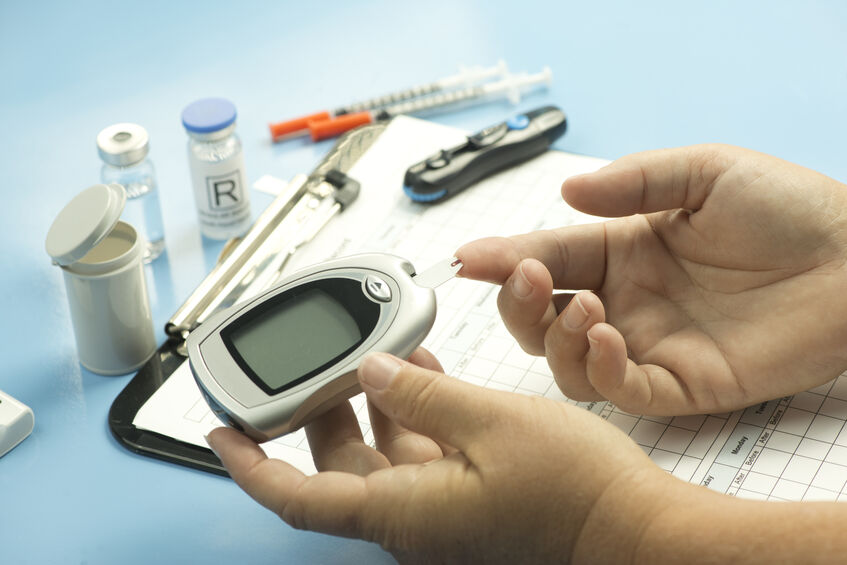-
National Diabetes Awareness Month: Do’s and Don’ts

November is National Diabetes Month, so the time is right to emphasize how diabetes impacts both your overall health and your feet in particular.
Kentlands Foot & Ankle Center knows how overwhelming it can be to manage this chronic condition alone, so with that in mind, we’ve gathered some helpful hints and tips to make at-home management far easier. Keep reading to learn the “Do’s and Don’ts” of diabetic foot care, courtesy of our expert team!
DO: Practice Good Nutrition
What you eat directly affects your diabetes management and foot health: high blood sugar can damage nerves and blood vessels, leading to serious complications.
- Do: Load up on fiber-rich foods like whole grains, fruits, vegetables, and legumes. These help regulate blood sugar, promote good digestion, and keep you feeling full for longer.
- Do: Choose lean protein sources like fish, poultry, beans, and lentils for essential nutrients without excess saturated fat.
- Do: Include healthy fats from avocados, nuts, seeds, and olive oil to support heart health.
DON’T: Forget Daily Foot Checks
Early detection is key to preventing serious foot problems.
- Don’t: Skip your daily foot inspection! Look for cuts, blisters, redness, swelling, or any changes in skin color or temperature.
- Don’t: Hesitate to contact your podiatrist if you notice anything unusual! Early intervention makes a big difference.
DO: Schedule Regular Podiatrist Visits
Routine care and regular foot screenings allow for early recognition of problems like ulcers, which can reduce the risk of lower limb amputation by up to 85%.
- Do: See your podiatrist at least once a year for a comprehensive foot exam, even if you don’t have any noticeable problems.
DON’T: Wear Restrictive Footwear
Certain shoe styles can worsen foot problems or restrict circulation.
- Don’t: Wear high heels, tight shoes, or pointed-toe shoes that squeeze your toes.
- Don’t: Wear shoes without proper arch support, especially if you have flat feet.
Wondering what else you can do to manage the complications of diabetes? We’ve got one more “Do” for you, then: give us a call and get in touch today!
Schedule a comprehensive foot examination with Kentlands Foot and Ankle Center podiatrist Dr. Jon M. Sherman. To schedule your appointment, please contact our office at 301-825-9697.
-
An Ounce of Prevention is Worth a Pound of Cure with Diabetes

When it comes to the diabetes epidemic, podiatrists are on the front lines. That’s why an expert DPM knows better than most that diabetes can seriously harm your feet. Recent statistics paint a troubling picture: The CDC asserts that nearly 39 million people, or 11.6 percent of the US population, currently have diabetes, with almost 9 million of those as yet undiagnosed. Millions more are pre-diabetic, and that number only becomes grimmer as people age.
Individuals with diabetes are at a higher risk of developing foot complications like neuropathy, poor circulation, and foot ulcers. From there, problems can get even worse. That’s why podiatric care is essential for anyone managing this disease. Check out a few of the helpful tips below, courtesy of Kentlands Foot & Ankle Center.
If you’re a diabetic, see a podiatrist regularly!
- Everyone with diabetes should have an annual exam, no matter what. But for some patients, even more visits will be required.
- Medicare will permit most people to schedule an appointment every two months to care for their nails and calluses. Take advantage of that, and try to stay consistent with your efforts.
Check your feet twice a day!
- Look for the unusual – cuts, redness, anything.
- If you see something, contact us right away.
- Don’t try to handle the problem yourself; you might risk infection or further complications.
DON’T GO BAREFOOT!
- As a diabetic, you always want to protect your feet.
- Wound healing is a dangerous issue, and even minor cuts can harm you more than you think.
- Wear shoes at all times!
Don’t let your diabetic foot care problems get out of hand. It’s important to take action right away if you notice anything amiss. We encourage residents of Montgomery County to consult Dr. Sherman sooner rather than later for a complete examination and assessment of diabetic foot health complications. Call 301-330-5666. or contact us online for an appointment at our Gaithersburg podiatry office. We look forward to getting you back on your feet and keeping you there!
-
Diabetes Awareness and Education

Did you know that more than 29 million Americans have diabetes? Even more frightening, one in four of those individuals are unaware of their condition.
Diabetes is a complex disease that requires daily self-management – making healthy food choices, staying physically active, monitoring your blood sugar, and taking medications as prescribed. Healthy lifestyle adjustments for individuals with diabetes can also help non-diabetic people transform their lives and increase overall health and wellness while also helping prevent a variety of health conditions later in life!
What is diabetes?
There are three main types of diabetes:
- Type 1 diabetes – This is when your body does not make insulin to take the sugar (glucose) from the foods you eat and turn it into energy for your body. If you have type 1 diabetes, you need to take insulin every day to live.
- Type 2 diabetes – This is when your body does not make or use insulin well. You might need to take pills or insulin to help control your diabetes. Type 2 is the most common type of diabetes.
Why is diabetes serious?
Diabetes can cause health problems such as heart attack or stroke, eye problems, nerve damage, kidney problems, foot problems, and teeth and gum problems. People with diabetes need to make healthy food choices, stay at a healthy weight, get physical every day, and take their medicines even when they feel good. It is a lot to do. It’s not an easy lifestyle for some, but it’s worth the benefits.
Diabetes and Your Feet
Foot problems most often happen when there is nerve damage, which is most often called neuropathy. This can cause tingling, pain, or weakness in the feet. It can also cause loss of feeling in the foot, so you could possibly injure it and not even know it. Poor blood flow or changes in the shape of your feet or toes may also appear. It is especially important for diabetes patients to take good care of their feet and see their doctor right away if you see any signs of foot problems.
If you are experiencing chronic foot pain or discomfort in your lower extremities, call our Montgomery office at 301-330-5666 and schedule an appointment with our board-certified podiatrist Dr. Jon M. Sherman or visit our website for more information. Please note that our office is currently open Monday, 10am-5:30pm, and Tuesdays and Thursdays, 10am-5pm.
RECENT POSTS
categories
- Uncategorized
- Featured Articles
- Foot Disorders
- Broken Ankle
- Broken Toe
- Fracture
- Foot Health
- Foot Care
- Arthritis
- Foot Pain
- Skin Cancer
- Podiatry Appointment
- Custom Orthotics
- Podiatrist
- Diabetes
- Gout
- Heart Health
- National Nutrition Month
- National Foot Health Awareness Month
- Foot Safety
- Foot and Ankle Injuries
- Falls Prevention
- Chronic Heel Pain
- Shoes
- Laser Therapy
- Quoted
- Physical Therapy
- KeryFlex
- Sweat
- Summer Foot Care
- Sports Injury
- ESWT
- Fungal Toenails
- Bunion


